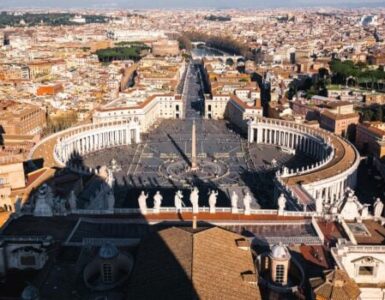Chesterton interprets Christ’s teaching that “you are the salt of the earth” (Matthew 5:13) to mean that Christians must be very different from the world, from the secular culture. He writes:
Salt seasons and preserves beef, not because it is like beef; but because it is very unlike it. Christ did not tell His apostles that there were only the excellent people, or the only excellent people, but that they were the exceptional people; the permanently incongruous and incompatible people. (Saint Thomas Aquinas, ch. 1)
He continues to explain that salt can only preserve foods if it remains salty, if it keeps its uniqueness. Thus, the Church can only preserve and evangelize the world if it remains different from the world. He concludes, “If the world grows too worldly, it can be rebuked by the Church; but if the Church grows too worldly, it cannot be adequately rebuked for worldliness by the world” (Saint Thomas Aquinas, ch. 1).
The Church is not meant to be worldly. It is not meant to be secular. Its whole point is to be different from the secular world. If it concedes to the culture, it loses itself. This means that the Church can never seek to be accepted by the culture, for the Church’s job is to correct the culture, to be counter-cultural. It means that the Church can never seek to be respectable in the eyes of the world, for it comes to transform the world.
Chesterton is right; Christ is very clear that being a Christian will earn only hatred from the world. In John’s Gospel, Christ tells His apostles, “If the world hates you, know that it has hated me before it hated you. If you were of the world, the world would love its own; but because you are not of the world, but I chose you out of the world, therefore the world hates you” (John 15:18-19). In the Beatitudes, Christ teaches us to rejoice when the world hates us: “Blessed are you when men revile you and persecute you and utter all kinds of evil against you falsely on my account. Rejoice and be glad, for your reward is great in heaven, for so men persecuted the prophets who were before you” (Matthew 5:11-12). Christ repeatedly warns the Apostles that they will be hated by all because of Him (Matthew 10:22, 24:9, Luke 21:17).
St. Paul repeats Christ’s warning about capitulation to the world. In Romans, he says, “Do not be conformed to this world but be transformed by the renewal of your mind, that you may prove what is the will of God, what is good and acceptable and perfect” (Romans 12:2). Christ warns the Church that they will be hated and persecuted by the world. Paul warns against being transformed by the world instead of transforming the world.
One thing this makes clear is that the Church should never desire or seek to be seen as a respectable institution in the eyes of the world. We should not seek acceptance from it. If we are true to Christ, it will never happen. It is simply an impossible goal. Further, it is not even a desirable goal.
The Church is meant to offend the world because the world is in the devil’s grip; “We know that we are of God, and the whole world is in the power of the evil one” (1 John 5:19). If the Church is not offending the world, the Church is failing.
This grave mistake—the desire to be accepted or respected by the world—has caused many of the Church’s problems in the last one-hundred years. It led to the watering down of moral teaching, casting millions into confusion about basic moral truths, especially surrounding human sexuality. It led to an uncritical acceptance of secular methodologies in theology (and especially scripture study), which made many lose their faith in Christ and caused decades of bad preaching by priests who were simply following their seminary formation. It led to a reconstitution of religious life which emptied many religious orders, thus radically altering Catholic education and healthcare—making them more like their secular counterparts. It has made us into cowards who fear persecution, rejection, and being considered bigots or weirdos, and thus, through fear, we fail to preach the Gospel to the world.
Scott Hahn has noticed this phenomenon and writes:
Unfortunately, we have spent the better part of the last century trying to assert what makes Catholics and Catholicism acceptable to secular liberals rather than accentuating our distinctiveness … the trend has too often been to compromise our uniqueness in order to play ball with the powers that be. And in the end, of course, we just get co-opted, losing our Catholic identity and winning little influence. (The First Society, 150)
The answer is clear, we must seek to be countercultural. To follow Christ, we must reject the world. To evangelize the world, we must not be respectable according to worldly standards, but respectable according to Christ’s standards. Chesterton writes:
[T]he Saint is a medicine because he is an antidote … He will generally be found restoring the world to sanity by exaggerating whatever the world neglects, which is by no means the same in every age … it is the paradox of history that each generation is converted by the saint who contradicts it most. (Saint Thomas Aquinas, ch. 1)
In order to transform the world for Christ, we must contradict the world. We must be ready (and expect) to be hated by the world (John 15). But we must not do hateful things; we must only do authentically loving things. We must not earn the world’s hatred by being hate-able, but by being Christlike. It is because the world is evil that it hates the goodness of Christ and the Church; it must not be because the Church or Christians do wicked deeds.
This preparation to be hated by the world, this attitude of not seeking approval from the world, must start with each one of us individually. Are we ready to stop craving the respect of the secular culture? Are we prepared to be labeled a bigot for the sake of Christ? Are we personally ready to suffer, to be “cancelled,” because of Christ? If not, then we cannot be Christ’s disciple, “Whoever does not bear his own cross and come after me cannot be my disciple” (Luke 14:27).
Photo by Dan Meyers on Unsplash












